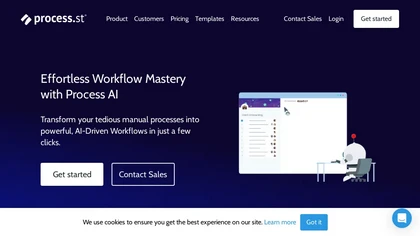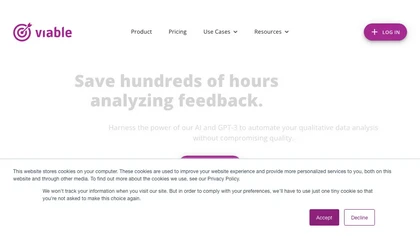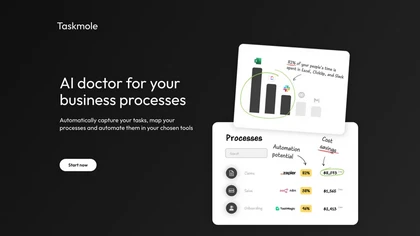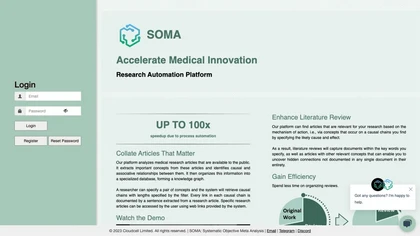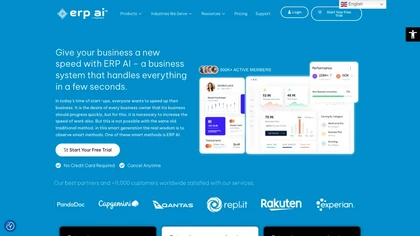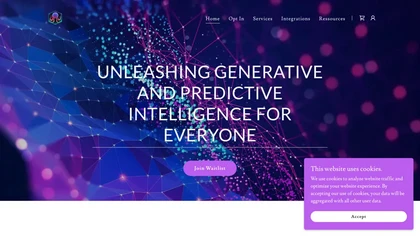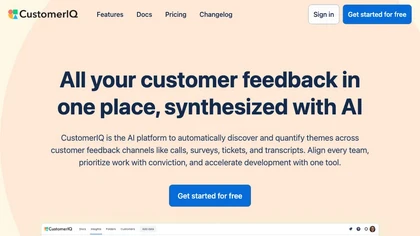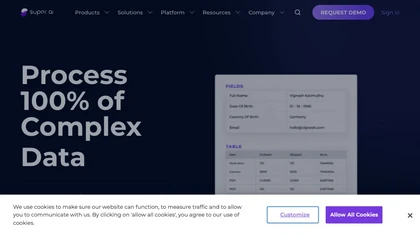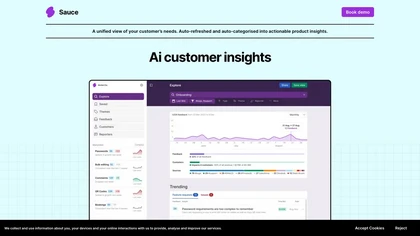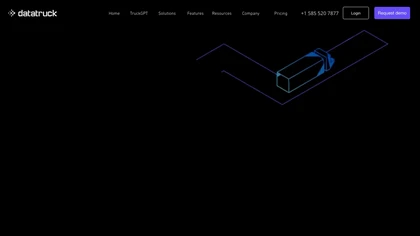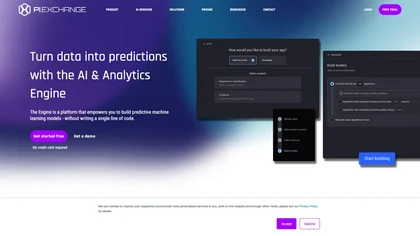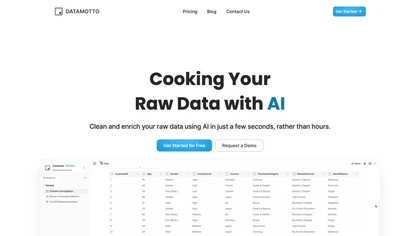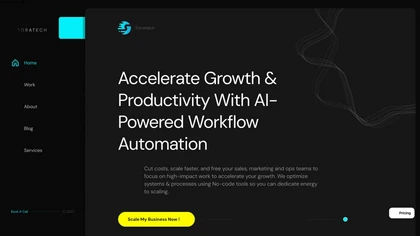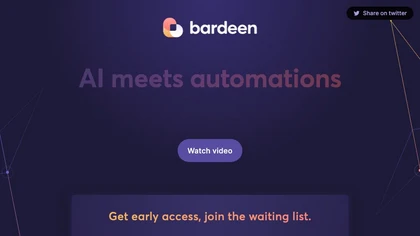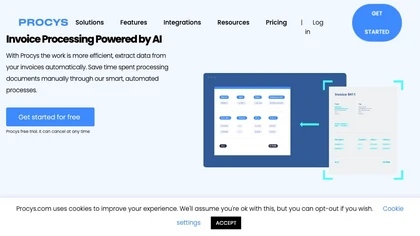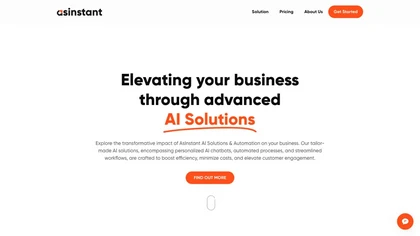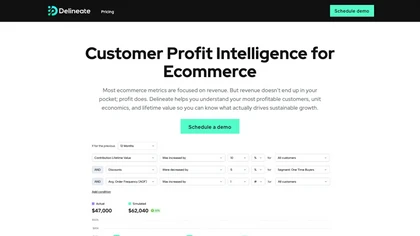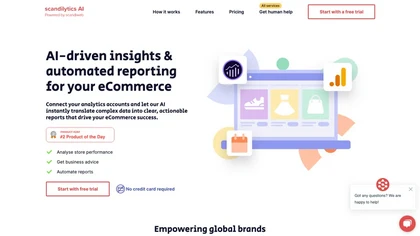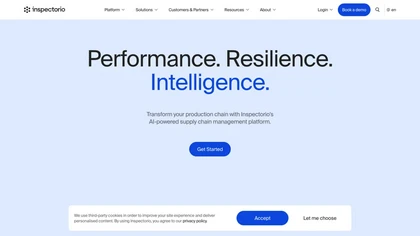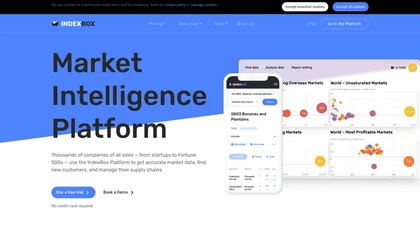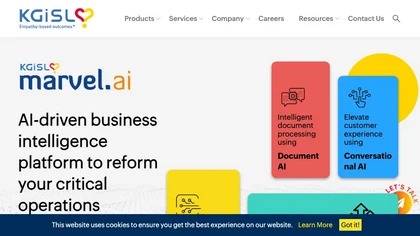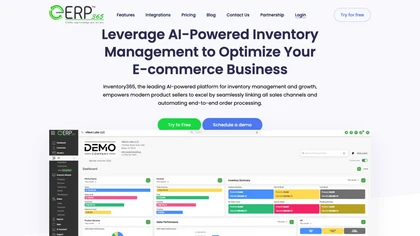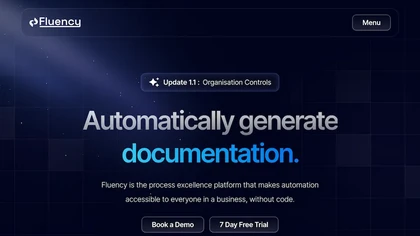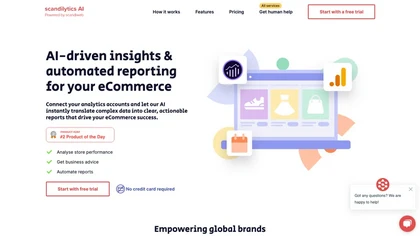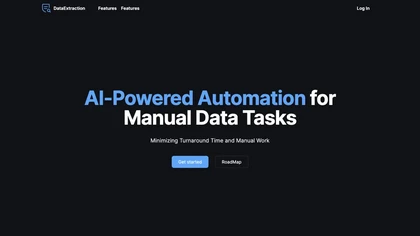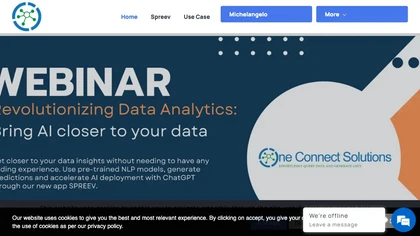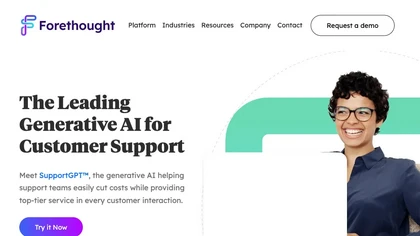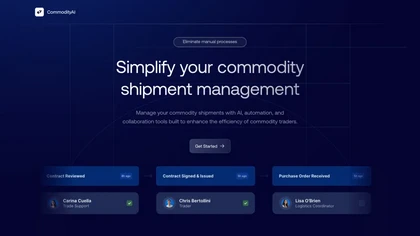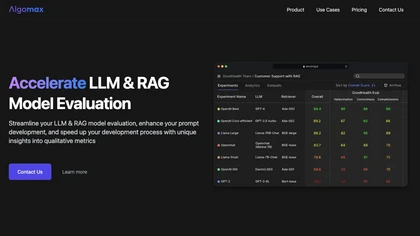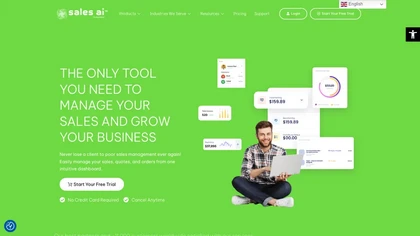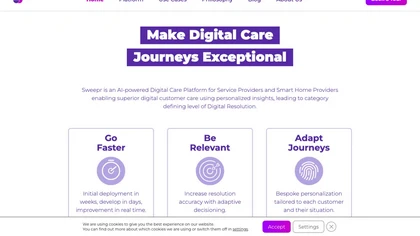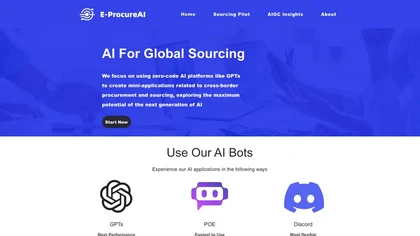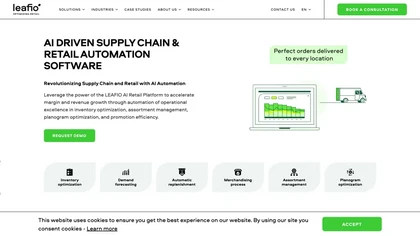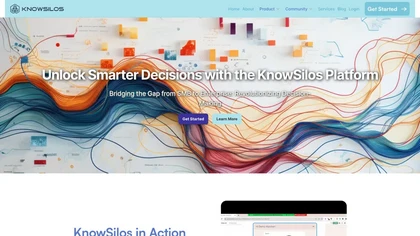AI use cases for Process Improvement
Generative AI can be applied in various applications for process improvement. Here are some examples to explore below for inspiration with AI tools to get you started with using AI in process improvement.
🛠️ 70 AI tools for Process Improvement
Explore a dynamic list of some of the most popular tools to get you started with various AI use cases and applications for Process Improvement to streamline your workflows and productivity today.
Process AI features
- Workflow generation
- Manage due dates and timelines
- Assign tasks to team members
- Built-in approval processes
- Document analysis
viable features
- Automated qualitative data analysis
- Customer feedback understanding
- Nlp technology
- Feedback analysis
Reform features
- Modular building blocks for customized solutions
- State-of-the-art multimodal AI models for logistics documentation
- Automation of data capture for various documents
- Seamless integration with universal transportation management systems (TMS) through a universal API
- Embeddable customer dashboards for real-time data insights
Process features
- AI-powered task generation
- Automated task creation process
- Task generation based on project requirements and deadlines
- Advanced security measures for data privacy
- Workflow simplification
Taskmole features
- Task capture and mapping
- Integration with Zapier and N8n
- Task mining for tracking computer activities
- Data encryption for security
- Tailored automation recommendations
Smartersales features
- Integration with zoom, teams, and meet
- Automated crm data entry
- Instant personalized feedback
- Detailed performance dashboards and summarized email reports
- Customizable experience
SOMA features
- Automating research process
- Collating and analyzing medical research articles
- Identifying causal and associative relationships
- Creating a knowledge graph for exploration
- API access for building pipelines in Python, R, or other languages
🔥
Create your account, save tools & get personal recommendations
Receive a weekly digest of our handpicked top tools.
Unsubscribe anytime
Unfig features
- Automated data capture from various logistics documents
- Universal TMS integrations for seamless connectivity
- Embeddable customer dashboards for real-time data insights
- Scraping information from numerous sources for visibility into logistics data
- Streamlining logistics operations with unprecedented speed and efficiency
empress.eco features
- AI-powered automation
- On-demand outsourcing solutions
- Software integrations
- Helpdesk services
- Industry-specific solutions
MEJ ERP AI features
- Intelligent automation
- Data-driven insights
- Real-time analytics
- Predictive forecasting
- Seamless integration capabilities
Predict Expert AI features
- Crafting unique AI models
- Integrating intelligent applications and APIs
- Tailoring AI models and applications to address specific business needs
- Real-time operational insights
- Monitoring performance in real-time
CustomerIQ features
- Aggregate feedback from various channels
- Powerful analytics for customer feedback
- Chat with data
- Automated segmentation and tagging
- Multiple integrations available
SuperAI features
- Automation of business processes
- Conversion of unstructured data to ai applications
Sauce features
- Auto-refreshing of customer needs
- Auto-categorizing of actionable product insights
- Real-time understanding of customer needs
- Monitoring of problem areas
- Data security with encryption
Perceptif features
- Auto-discovery
- Custom experiences
- Process optimization
- Benchmarking solutions
- Competitor analysis
Resume Analyzer AI features
- Automated model generation
- Automated model evaluation
- Integration with popular data analysis platforms
- Streamlined training and deployment process
- Optimization of model performance
Datatruck features
- Automating manual processes
- Providing reporting analytics
- Offering actionable insights through AI/ML analytics
- Hyper automation capabilities
- Seamless data integration and real-time visibility
Pi Exchange features
- End-to-end machine-learning tool
- Eliminates the need for coding
- Smart data preparation
- Model development
- Deployment functionalities
DataMotto features
- Data cleaning and enrichment using advanced algorithms
- Data validation processes
- Data gap filling for comprehensive dataset
- Data consistency maintenance with formatting standardization
- Data privacy and security prioritization
Soratech features
- AI-powered workflow automation
- No-code tools utilization
- Access to top-tier experts
- Fixed monthly subscription model
- Focus on automation solutions for various business functions
WolongAI features
- Automated data tasks
- Machine learning algorithms for pattern detection
- Data collection, cleaning, and analysis automation
- Personalized support for task streamlining
- Scheduling meetings and managing emails automation
bardeen features
- Automation
- Manual workflow
- Ai
- Workflow management
- Process automation
Elapse features
- Structured feedback generation
- Continuous learning from interactions
- Access to past conversations and documentation
- Automation of 70% of customer support tasks
- Data-driven insights for product updates
Glass features
- Omnichannel customer relationship automation
- Integration with various platforms like WhatsApp, chat APIs, Instagram, and QR codes
- Virtual business analyst capabilities
- AI-powered chatbots for 24/7 support and personalized engagements
- Predictive analytics for better product optimization
Journey Automagic AI features
- Centralized platform for sharing files, links, and resources
- Facilitates real-time interactions with prospects
- Creates and shares different types of media
- Enhances sales pipeline and boosts visibility
- Enables users to control the entire sales journey
Painpoints features
- Tracking
- Analyzing
- Sifting
- Summarizing
- Organizing
CapGo.AI features
- Real-time data filling in spreadsheets
- One-click functionality for gathering vast amounts of data
- Email verification
- Customer information extraction
- AI messaging capabilities
Procys features
- Invoice extraction
- Document validation
- Automated data entry
- Digitization of invoices
Ask String features
- Data analysis
- Efficient
- Simplify
- Direct conversations
- Technical skill level
M1-project features
- Ideal Customer Profile (ICP) and buyer persona generation
- Marketing ROI improvement plan
- Founder growth opportunities generation
Cognosys features
- Automating tasks through AI agents
- Conducting in-depth market analysis
- Examining consumer preferences
- Identifying regulatory challenges
- Analyzing key industry players within specific sectors
Asinstant features
- Personalized AI chatbots
- Automated processes
- Streamlined workflows
- Custom-built data automations
- Deployment, integration, and ongoing client support
Delineate features
- Unified analytics for financial, customer, product, and marketing insights
- AI predictive lead scoring
- Customer analytics, cohort analysis, customer lifecycle analysis, and customer segments
- Scenario simulation
- Data integration from various sources
Contractify features
- Automatic contract tasks and notifications
- Proactive deadline management
- Secure contract repository
- Efficient contract approval flows
- AI capabilities for contract analysis and digitization
GeniePM features
- Product requirements
- User stories
- Use cases
Data Analyst AI features
- Data Analyst AI
- Automated reporting
- Tailored marketing strategies
- Streamlined marketing efforts
- Secure data processing
inspectorio.com features
- AI-powered supply chain management platform
- Utilization of innovative technologies like AI
- Digitizes and connects supply chain processes within a single tool
- Enables intelligent analysis of the entire ecosystem
- Reduces production chain risks through advanced analytics
IndexBox
5IndexBox features
- Access to accurate market data
- User-friendly interface for quick generation of market reports
- Predictive modeling for forecasting market trends
- Machine learning capabilities
- Data integrity through cross-checking from multiple sources
MagicProspect features
- Automated prospecting
- AI-generated dossiers
- Integration with existing sales tools through RESTful API
- Mystical credit system
- Flexible pricing options
MarvelAI
4.6MarvelAI features
- Comprehensive data analysis
- Informed decision-making
- Superior customer experience
- 67% reduction in operational costs
- 100% data privacy
Dairytech.ai features
- milkround automation
- automatic payment collection
- stock reconciliation
- online order management
- customer communication
DEVTOM features
- Real-time market data utilization
- AI-driven analyses
- AI sentiment analysis
- Competitive analysis
- Supply chain intelligence
Inventory365 features
- Real-Time Inventory Tracking
- Warehouse Management
- Multi-location Fulfillment
- AI-Powered Demand Prediction
- Seamless Integration
RapidAI features
- Customized AI tools
- Streamline operations
- Reduce costs
- Range of powerful AI tools
- Optimize work
Lume features
- Automated data mapping
- Generation of mapping logic
- Effortless data movement between schemas
- Rapid scaling of data ingestion
- Normalization of messy data from various systems
AIEmployee features
- browser automation
- email-to-CRM/ERP data transfers
- automating tasks requiring human-like intelligence
- logging in budget and email expense tracking
- creating workflows
Servcy features
- Consolidate data from multiple tools into one central location
- Aggregated inbox to view and respond to various communications in one place
- AI support to prioritize and respond to important messages promptly
- AI capabilities for storing and managing documents as well as answering questions
- Features for tracking payments, analyzing time, merging calendars, and providing planning insights
Fluency.com features
- Automated Process Documentation
- Process Insights
- AI Assistant
- Automations
- Audit View
Productroadmap features
- Automatically connects with crm and support tools
- Prioritizes feature gaps based on revenue potential
- Surfaces key themes, common feature requests
- Streamlines collaboration between product teams
Scandilytics features
- Advanced analytics for store performance insights
- Business advice based on data analysis
- Automated reporting processes
- Connection with analytics accounts for data translation
- AI-based trend analysis and opportunity identification
Data Extraction features
- Automates manual data tasks
- Customizable extraction rules
- Efficient data extraction process
- Utilizes natural language processing
- Incorporates machine learning technologies
SPREEV features
- Data integration
- Machine learning
- Semantic analytics
- Code/low-code automation
- Decision making
Forethought features
- Automate customer support
- Lower support costs
- Provide top-tier service
- Efficient customer interactions
CommodityAI features
- Automated shipment processes
- Auto-generated shipping nominations
- Real-time shipment tracking
- AI-driven performance analytics
- Smart data extraction
Tricuss features
- Knowledge specialization
- Project management
- Automation apps
- Support for large language models
- AI capabilities enhancement
Typo features
- Measure effort and cost spent on innovation
- Technical debt
- Roadmap
- Identify sdlc metrics that impact development efficiency
- Remove blockers in real-time
Kodus features
- Team performance analysis
- Improvement suggestions for increased productivity
- Automated management tasks
- Weekly reports and metrics
- Automation for enhancing team productivity
Relatas features
- Streamlines sales reviews
- Connects sales activities, pipelines, and forecasts
- Automated deal creation feature
- Quotation intelligence for faster processes
- Real-time pipeline updates
Flowsage Beta features
- AI-powered completions
- Intelligent auto-completions
- Real-time collaboration
- Analyzing and optimizing flowcharts
- AI-driven chat support
Algomax features
- Smooth integration into pipeline
- Comprehensive insights through intuitive dashboard
- Accurate evaluation engine
- Detailed visualizations and constructive feedback
- Qualitative and quantitative metrics for contextual quality measurement
Automatica features
- Automated lead generation
- Custom lead qualification
- Personalized cold outreach
- Meeting bookings
- Seamless integration with existing systems
Mom shop app features
- AI-powered features
- Streamlined e-commerce
- Effective service management
- AI-generated content
- Simplified order management
MEJ Sales AI features
- Sentiment analysis
- Natural language processing
- Identifying positive, negative, or neutral sentiments
- Insights into customer opinions and preferences
- Data-driven decision making
idPOD features
- Data integration and analysis
- Integration of multiple data sources
- Advanced algorithms
- Customizable features
- Improving decision-making
numerous features
- Categorization
- Extraction
- Data Cleaning
- Sentiment Analysis
- Automate with AI
sweepr.com features
- Personalized insights for digital customer care
- Adaptive decision-making
- Bespoke personalization
- Omnichannel support
- Generative AI capabilities
E-Procure AI features
- Zero-code AI platform integration
- Recommendation of supply locations and suppliers
- Market expansion assistance
- Product opportunity identification
- Real-time exchange rate inquiries
LEAFIO AI Retail features
- AI-driven supply chain and retail automation software
- Automation of inventory optimization, assortment management, planogram optimization, and promotion efficiency
- Features such as demand forecasting, automatic replenishment, and merchandising process optimization
- Caters to various industries including retail, grocery, convenience stores, pharmacies, liquor stores, etc.
- Comprehensive suite of AI-powered tools to streamline retail operations and drive profitable growth
YC Application Optimizer features
- Data integration for structured knowledge graphs
- Extraction of insights from PDFs using NLP algorithms
- Creation of easily digestible reports with customizable templates
- Aggregation of large-scale data for quick analysis
- Visualization of critical information through persuasive reports
Eververse features
- Automated feedback processing
- Sentiment analysis
- Predictive AI prioritization
- Visual roadmaps
- Customizable feature statuses
